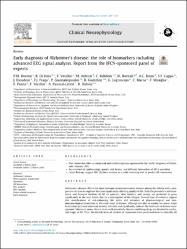Early diagnosis of Alzheimer's disease: the role of biomarkers including advanced EEG signal analysis. Report from the IFCN-sponsored panel of experts

Göster/
Erişim
info:eu-repo/semantics/openAccessTarih
2020Yazar
Rossini, Paolo MariaDi Iorio, Riccardo
Vecchio, F.
Anfossi, Maria
Babiloni, C.
Bozzali, M.
Bruni, Amalia Cecilia
Cappa, Stefano F.
Escudero, Julien
Fraga, Francisco Jose
Giannakopoulos, Panteleimon
Güntekin, Bahar
Logroscino, Giancarlo
Marra, Camillo
Miraglia, F.
Panza, Francesco
Tecchio, F.
Pascual-Leone, Alvaro
Dubois, Bruno
Üst veri
Tüm öğe kaydını gösterKünye
Rossini, P. M., Di Iorio, R., Vecchio, F., Anfossi, M., Babiloni, C., Bozzali, M. ... Dubois, B. (2020). Early diagnosis of Alzheimer's disease: the role of biomarkers including advanced EEG signal analysis. Report from the IFCN-sponsored panel of experts. Clinical Neurophysiology, 131(6), 1287-1310. https://dx.doi.org/10.1016/j.clinph.2020.03.003Özet
Alzheimer's disease (AD) is the most common neurodegenerative disease among the elderly with a progressive decline in cognitive function significantly affecting quality of life. Both the prevalence and emotional and financial burdens of AD on patients, their families, and society are predicted to grow significantly in the near future, due to a prolongation of the lifespan. Several lines of evidence suggest that modifications of risk-enhancing life styles and initiation of pharmacological and nonpharmacological treatments in the early stage of disease, although not able to modify its course, helps to maintain personal autonomy in daily activities and significantly reduces the total costs of disease management. Moreover, many clinical trials with potentially disease-modifying drugs are devoted to prodromal stages of AD. Thus, the identification of markers of conversion from prodromal form to clinically AD may be crucial for developing strategies of early interventions. The current available markers, including volumetric magnetic resonance imaging (MRI), positron emission tomography (PET), and cerebral spinal fluid (CSF) analysis are expensive, poorly available in community health facilities, and relatively invasive. Taking into account its low cost, widespread availability and non-invasiveness, electroencephalography (EEG) would represent a candidate for tracking the prodromal phases of cognitive decline in routine clinical settings eventually in combination with other markers. In this scenario, the present paper provides an overview of epidemiology, genetic risk factors, neuropsychological, fluid and neuroimaging biomarkers in AD and describes the potential role of EEG in AD investigation, trying in particular to point out whether advanced analysis of EEG rhythms exploring brain function has sufficient specificity/sensitiv ity/accuracy for the early diagnosis of AD.

















